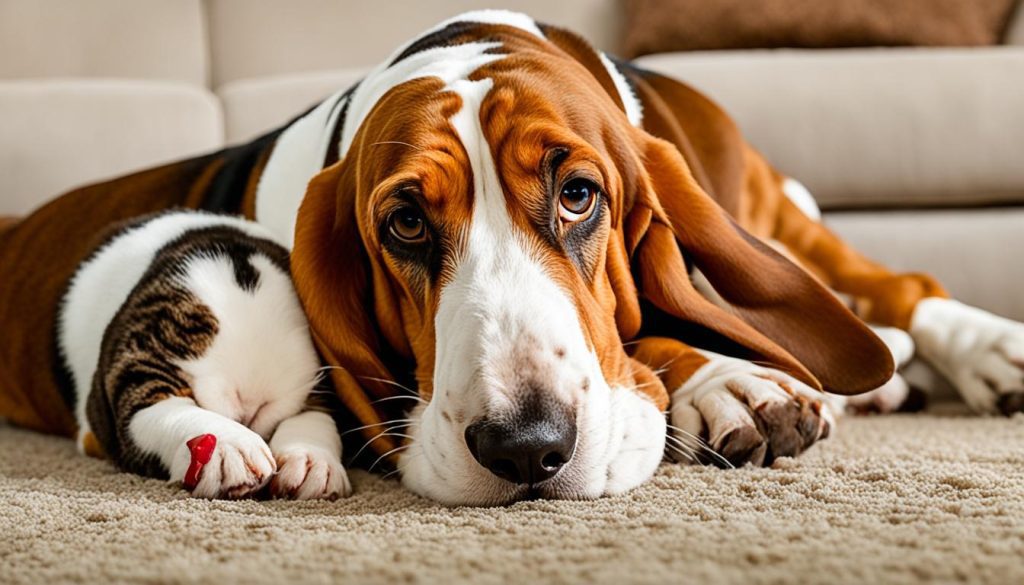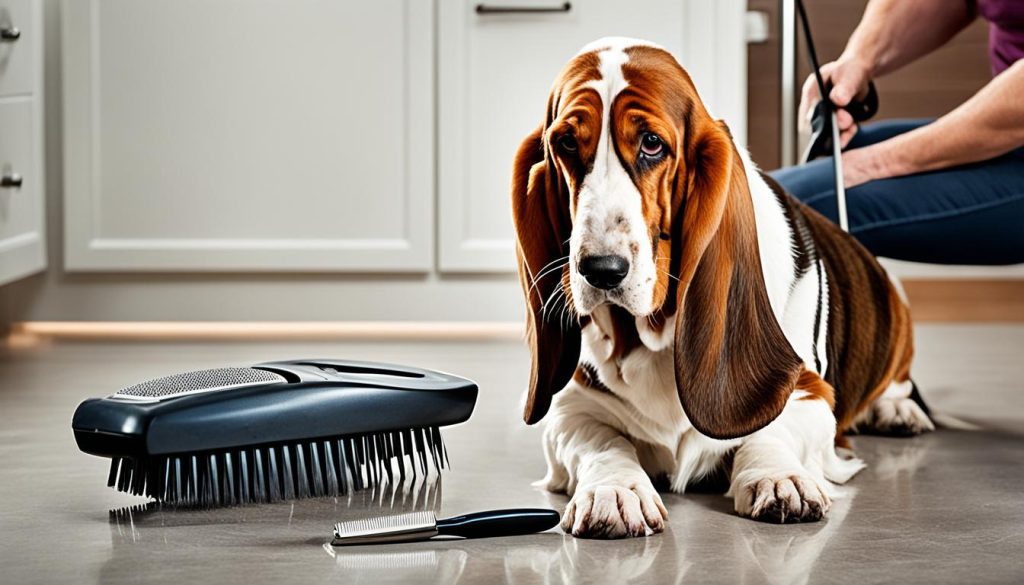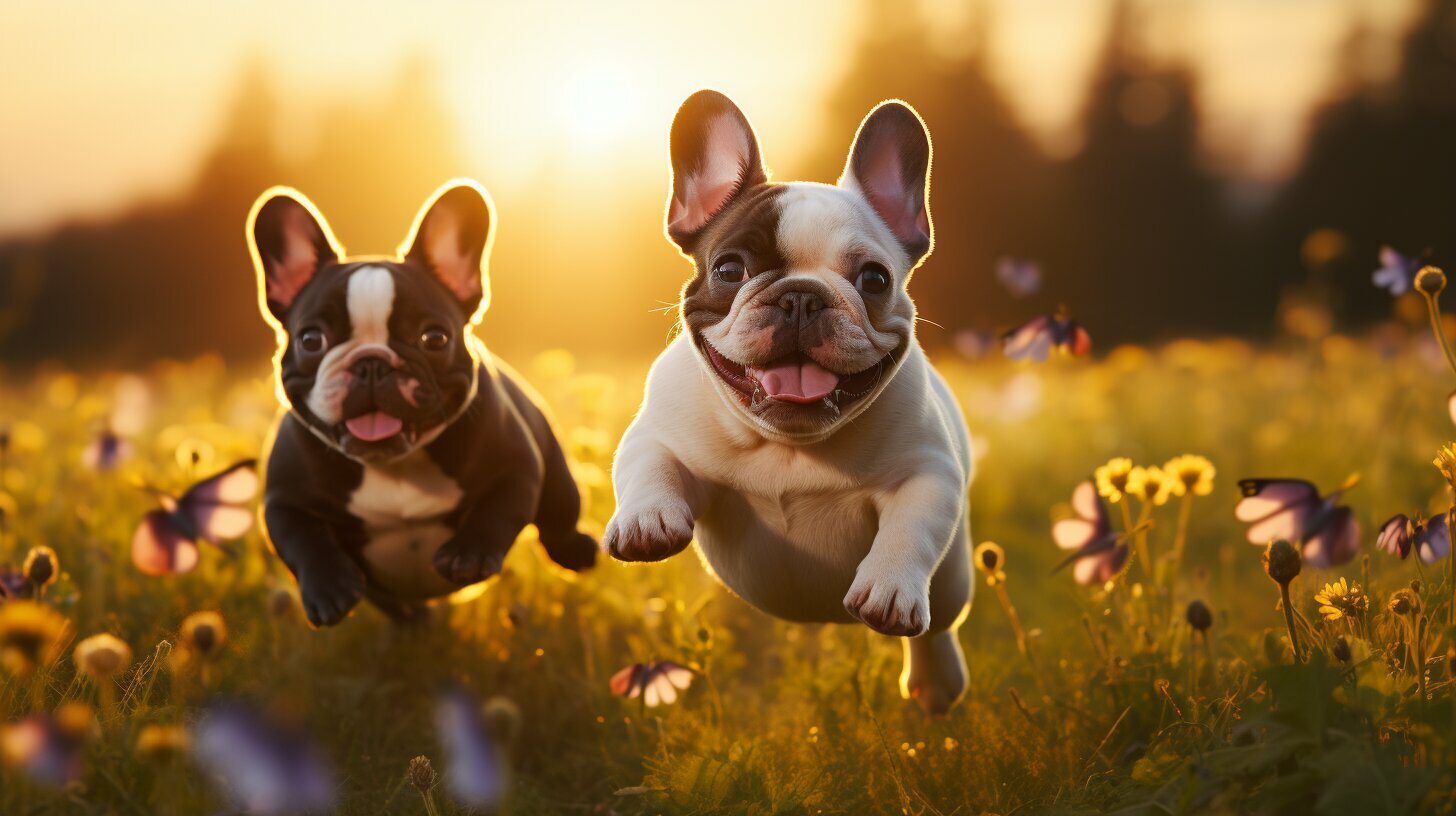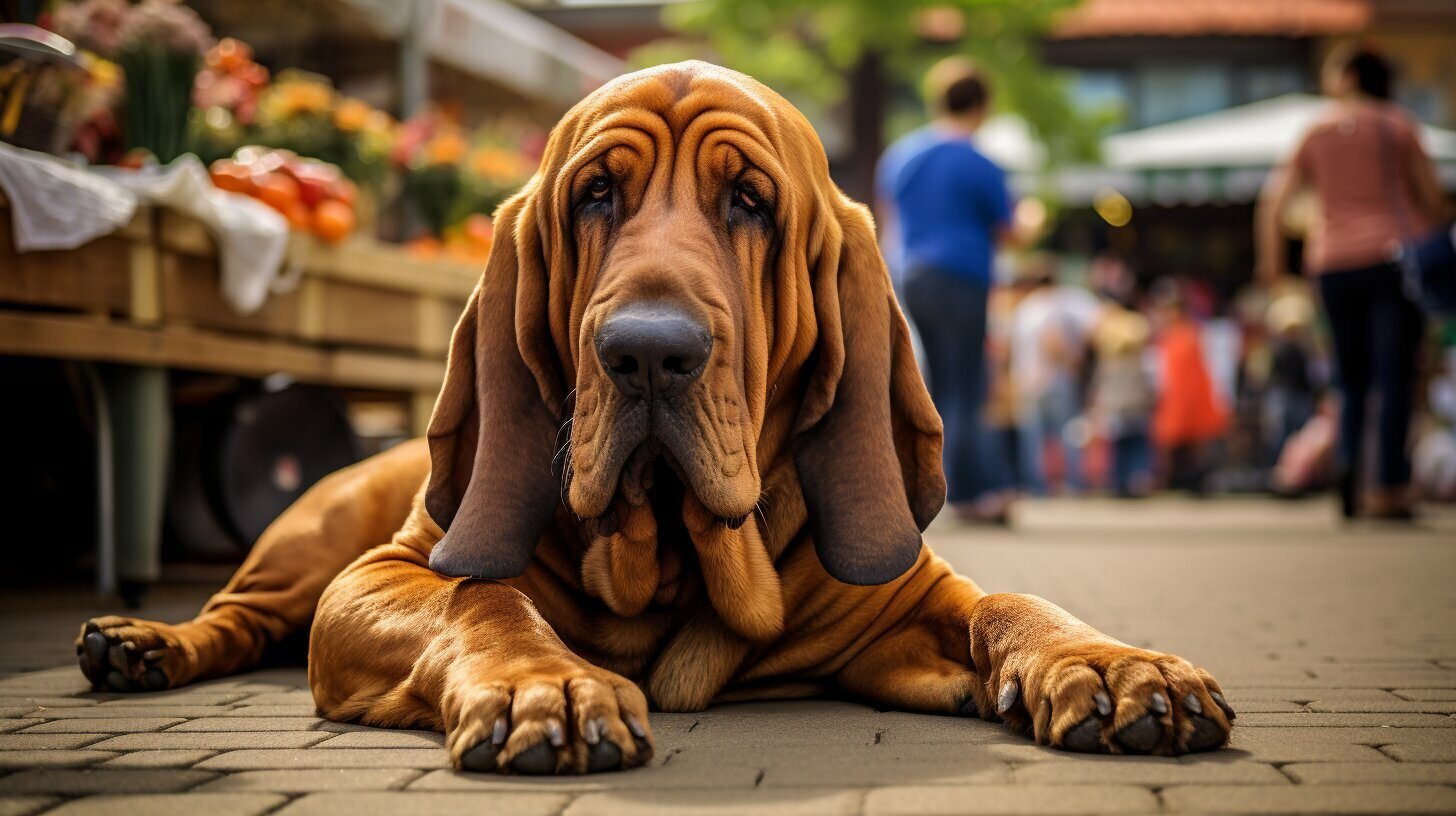Are Basset Hounds smart? This is a question that often divides dog owners and enthusiasts. Some argue that Basset Hounds may not be the smartest breed, while others believe they possess unique problem-solving abilities.
When it comes to intelligence, Basset Hounds have their own clever ways of doing things. While they may not compete with the top smartest dog breeds, they have their own strengths and adaptability. Understanding their behavior and training techniques can help bring out their full potential.
In this article, I will delve into the intelligence level of Basset Hounds and provide you with insights into their behavior, training tips, and how they compare to other smart dogs. So let’s explore the world of Basset Hounds and discover what makes them one of a kind!
Basset Hound Origins and History
The Basset Hound, one of the most beloved dog breeds, has a rich history that spans centuries. This section explores the origins of Basset Hounds and their fascinating journey to becoming cherished companions.
Origins of Basset Hounds
The story of the Basset Hound began in France, where they were specifically bred for hunting small game, particularly rabbits and hares. Breeders aimed to create a dog with a low stature and a keen sense of smell to track game efficiently.
To achieve this, the Bloodhound, known for its exceptional scenting ability, was crossbred with the St. Hubert’s Hound, a breed famous for its tracking skills. This deliberate crossing resulted in the creation of the Basset Hound, a breed with a distinctive appearance and exceptional hunting abilities.
History of Basset Hounds
The Basset Hound made its debut in the mid-1800s and quickly gained popularity in France. Their unique appearance and exceptional scenting skills caught the attention of hunting enthusiasts and nobility alike.
In the late 19th century, Basset Hounds crossed the Atlantic and arrived in the United States, where they continued to captivate dog lovers. The breed’s charming personality and excellent tracking abilities contributed to their rise in popularity, leading to the official recognition of the Basset Hound by the American Kennel Club in 1885.
Throughout history, Basset Hounds have evolved in appearance and temperament, with breeders working to refine their traits while preserving their hunting instincts. Today, these dignified and charming dogs remain a beloved breed among dog enthusiasts around the world.
| Year | Event |
|---|---|
| Mid-1800s | Basset Hounds debut in France |
| 1885 | American Kennel Club recognizes the Basset Hound |
Physical Characteristics
Basset Hounds are known for their unique and distinctive physical features that set them apart from other dog breeds. These characteristics contribute to their charm and appeal.
One of the most recognizable traits of Basset Hounds is their long ears. They have low-set ears that hang down to their cheeks, giving them a distinct and endearing look. Their droopy eyes, which are large and brown, add to their sad expression, melting the hearts of many dog lovers.
Another defining feature of Basset Hounds is their short legs. Despite their small size, they have a sturdy and well-built body with a deep chest. This body structure allows them to navigate dense undergrowth during hunting expeditions. Males typically weigh between 55-75 pounds, while females weigh between 45-65 pounds, making Basset Hounds a medium-sized breed.
Basset Hounds have a snout that is long and narrow, complemented by a prominent nose. This snout helps them pick up scents and track their targets effectively. Their short and dense coat comes in a variety of colors, including tan, black, and white combinations.
Physical Characteristics Summary:
| Characteristic | Description |
|---|---|
| Long Ears | Low-set ears that hang down to their cheeks |
| Droopy Eyes | Large and brown, giving them a sad expression |
| Short Legs | Sturdy body with a deep chest and short legs |
| Narrow Snout and Prominent Nose | Long and narrow snout with a prominent nose for effective scent detection |
| Medium Size | Males weigh between 55-75 pounds, and females weigh between 45-65 pounds |
| Short and Dense Coat | Comes in various colors such as tan, black, and white |
These physical characteristics contribute to the overall appearance and charm of Basset Hounds, making them easily recognizable and beloved by many dog enthusiasts.
Personality and Temperament
Basset Hounds are known for their laid-back and friendly personalities. They are generally easy-going and sociable, making them great companions for families with children and other pets.
Basset Hounds are pack animals and enjoy being around their family. They form strong bonds with their human companions and get along well with other pets when properly introduced.
Although Basset Hounds can be stubborn at times, with patience and consistency, they can be trained to follow basic commands. They are known to be vocal and may bark or howl to communicate with their owners.
When it comes to interacting with their families, Basset Hounds are known for their loving and affectionate nature. They thrive on attention and enjoy being part of the family activities.

Are Basset Hounds Smart? Intelligence and Trainability
Basset Hounds are often described as intelligent in their own way. They possess a unique problem-solving ability and adaptive intelligence, which allows them to figure out how to solve problems on their own. Despite their intelligence, their independent nature can make them stubborn and challenging to train.
To effectively train Basset Hounds, positive reinforcement techniques, such as treats and rewards, work best. These techniques motivate and encourage the dogs to learn new commands and behaviors. Consistency, patience, and a strong bond with the owner are key elements in successfully training Basset Hounds.
Training these intelligent dogs requires an understanding of their unique characteristics and behaviors. Basset Hounds thrive on mental stimulation, so incorporating puzzle toys or interactive games into their training sessions can keep them engaged and motivated.
When it comes to problem-solving abilities, Basset Hounds can surprise you with their creative solutions. Their persistent and determined nature allows them to overcome obstacles and find alternative ways to accomplish tasks.
Training Techniques for Basset Hounds
1. Positive reinforcement: Use treats, praises, and rewards to motivate and reinforce desired behaviors.
2. Consistency: Establish a consistent training routine and use consistent verbal and visual cues to avoid confusion.
3. Patience: Basset Hounds may take longer to learn certain commands, so patience is essential during the training process.
4. Socialization: Expose Basset Hounds to various environments, people, and animals from an early age to ensure they develop into well-rounded and friendly dogs.
5. Firm but gentle approach: Basset Hounds respond well to gentle yet firm guidance during training sessions. Avoid using harsh methods or physical punishment.
Remember, each Basset Hound is unique, and their training progress will vary. Understanding their intelligence, problem-solving abilities, and specific training needs will help you build a strong and positive relationship with your Basset Hound.
Care and Grooming
Proper care and grooming are essential for keeping your Basset Hound healthy and comfortable. In this section, I will discuss the grooming needs, shedding, and health considerations specific to Basset Hounds.
Grooming Needs
Basset Hounds have short coats that shed moderately year-round. Regular brushing is important to remove loose hair and minimize shedding. A soft bristle brush or grooming glove can be used to gently brush their coat. Be prepared for some regular vacuuming to tackle the shedding.
Aside from regular brushing, it is also necessary to trim your Basset Hound’s nails regularly to prevent them from becoming too long and causing discomfort. You can use a dog nail trimmer or seek the help of a professional if you’re not comfortable doing it yourself.
Another important aspect of grooming is cleaning your Basset Hound’s ears. Due to their droopy ears, Basset Hounds are prone to ear infections. Use a damp cloth or specialized dog ear cleaner to clean their ears regularly, making sure to be gentle and avoid inserting anything into the ear canal.
Health Considerations
Basset Hounds are generally healthy dogs, but like any breed, they can be prone to certain health issues. Some common health conditions seen in Basset Hounds include:
- Glaucoma: Basset Hounds are more susceptible to developing glaucoma, a condition that affects the eyes and causes increased pressure, which can lead to vision loss if left untreated. Regular eye check-ups are important for early detection.
- Weight Gain: Basset Hounds have a tendency to gain weight, so it’s essential to monitor their diet and ensure they receive regular exercise to maintain a healthy weight. Obesity can lead to various health problems.
Regular visits to a veterinarian are essential to monitor your Basset Hound’s overall health, address any concerns, and ensure they receive the necessary vaccinations and preventive treatments.

Basset Hound as a Family Pet
Basset Hounds are wonderful family pets due to their friendly and sociable nature. They are patient and gentle, which makes them great companions for children. Their calm temperament and love for human company make them excellent playmates for kids of all ages.
When it comes to compatibility with other animals, Basset Hounds generally get along well with other pets. However, it is important to provide proper supervision, especially when introducing them to smaller animals. Basset Hounds have hunting instincts, and their curiosity may lead them to chase smaller pets.
Basset Hounds adapt well to various lifestyles. While they require regular exercise to maintain good health, they are not high-energy dogs. Daily walks, along with interactive playtime, are usually sufficient to meet their exercise needs. However, it is essential not to leave them alone for long periods as they may develop separation anxiety.
Overall, Basset Hounds make excellent family pets, providing constant companionship, love, and joy to their human family members.
- Basset Hounds are friendly and sociable, making them great family pets.
- They are patient and gentle, making them suitable companions for children.
- Basset Hounds generally get along well with other pets, but proper supervision is necessary.
- They require regular exercise, such as walks, but are not high-energy dogs.
- Leaving them alone for long periods may lead to separation anxiety.
Conclusion
Basset Hounds possess their own unique intelligence and problem-solving abilities. While they may not be considered one of the smartest dog breeds, their intelligence should not be underestimated.
Training Basset Hounds requires patience, consistency, and a gentle approach. Positive reinforcement techniques, such as treats and rewards, prove to be effective in harnessing their intelligence and willingness to learn.
With the right training, love, and attention, Basset Hounds make wonderful companions for families seeking a sociable and loyal pet. Their friendly and easy-going nature, coupled with their intelligence, make them a great addition to any household.






